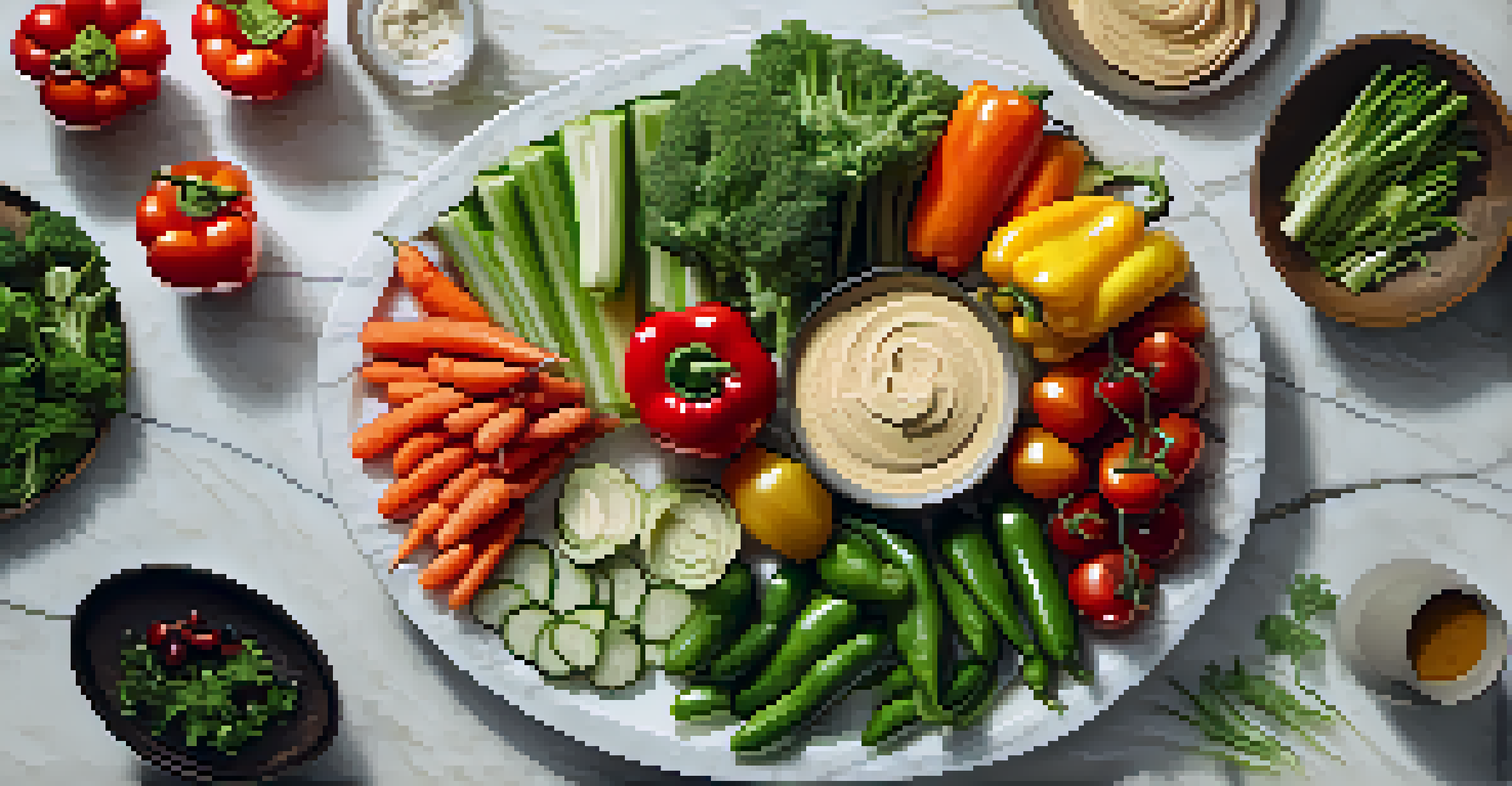How a Vegetarian Diet Can Boost Your Weight Loss Journey

Understanding the Basics of a Vegetarian Diet
A vegetarian diet primarily focuses on plant-based foods, including fruits, vegetables, grains, nuts, and seeds. Unlike a vegan diet, vegetarians may still consume dairy products and eggs, which can provide essential nutrients. This diet is not only rich in fiber but also low in saturated fats, making it a great option for those looking to lose weight sustainably.
Let food be thy medicine and medicine be thy food.
By incorporating a variety of plant-based foods, vegetarians often consume fewer calories while still feeling full and satisfied. Think of it as filling your plate with colorful, nutritious options that nourish your body while keeping your caloric intake in check. This can create a natural calorie deficit, which is a key factor in weight loss.
Moreover, the abundance of vitamins, minerals, and antioxidants found in plant foods supports overall health, enhancing energy levels and promoting a more active lifestyle. As you embark on your weight loss journey, a vegetarian diet can serve as an excellent foundation for making healthier choices.
Increased Fiber Intake for Satiety
One of the standout features of a vegetarian diet is its high fiber content. Foods like beans, lentils, whole grains, and vegetables are not only great for digestion but also help you feel fuller for longer. Imagine fiber as a sponge in your stomach that absorbs water and expands, keeping hunger at bay.

When you consume high-fiber meals, you’re less likely to reach for unhealthy snacks between meals. This can significantly reduce your overall calorie intake, which is beneficial for weight loss. Plus, fiber-rich foods often take more time to chew and digest, allowing your brain to register fullness more effectively.
Plant-Based Diet Aids Weight Loss
A vegetarian diet focuses on nutrient-rich, low-calorie foods that promote weight loss while keeping you satisfied.
Incorporating a variety of fiber sources into your meals can also enhance your gut health. A happy gut means better nutrient absorption and a more effective metabolism, which can further assist in your weight loss efforts.
Reduced Caloric Density in Meals
Vegetarian meals are often lower in caloric density, meaning you can eat larger portions without consuming excessive calories. For instance, a big salad packed with vegetables, legumes, and a light dressing can be very filling yet low in calories. This allows you to enjoy satisfying meals while keeping your weight loss goals in sight.
The food you eat can be either the safest and most powerful form of medicine or the slowest form of poison.
By focusing on whole foods and avoiding highly processed options, you're naturally steering away from added sugars and unhealthy fats. This conscious choice helps to create a balanced diet that promotes weight loss rather than weight gain. Think of it this way: you can indulge in a hearty vegetable stir-fry or a large fruit salad without the guilt.
Additionally, the act of preparing and enjoying meals made from fresh ingredients can enhance your relationship with food. This mindful approach not only benefits your waistline but also supports mental well-being during your weight loss journey.
Nutrient-Dense Foods for Optimal Health
A vegetarian diet encourages the consumption of nutrient-dense foods, which provide more vitamins and minerals per calorie than their processed counterparts. Foods like quinoa, sweet potatoes, and leafy greens are packed with nutrients that support metabolic health, which is crucial for effective weight loss. Think of these foods as the building blocks of a healthier body.
When you fill your plate with nutrient-rich options, you're not just aiding in weight loss; you're also fueling your body for better performance in daily activities and workouts. This can lead to increased energy levels, making it easier to stay active and engaged in your fitness routine.
Fiber Keeps You Full Longer
High fiber intake from plant foods helps control hunger and reduces the likelihood of unhealthy snacking.
Moreover, choosing a variety of colors on your plate often correlates with a broader spectrum of nutrients. This diversity not only keeps your meals exciting but also ensures you’re meeting your nutritional needs while on your weight loss journey.
Mindful Eating Practices to Combat Cravings
Adopting a vegetarian diet can naturally lead you to practice mindful eating, which is key in managing cravings and emotional eating. By focusing on whole foods and savoring each bite, you can develop a healthier relationship with food. Picture this: instead of mindlessly snacking while watching TV, you take the time to enjoy a colorful veggie platter.
Mindful eating encourages you to listen to your body’s hunger cues, helping you distinguish between physical hunger and emotional cravings. This awareness can empower you to make better food choices that align with your weight loss goals. You might find yourself less likely to reach for that sugary treat when you pause to assess your true hunger.
Incorporating mindfulness into your meals can also enhance your satisfaction levels, making you less inclined to overeat. As you explore a vegetarian lifestyle, these practices can support not only your weight loss journey but also your overall well-being.
The Role of Plant Protein in Weight Loss
Plant proteins, found in foods like beans, lentils, tofu, and nuts, play a crucial role in a vegetarian diet, especially for those looking to lose weight. Unlike animal proteins that can be high in saturated fats, plant-based proteins often come with added fiber and nutrients. This combination helps you feel satisfied while also promoting muscle maintenance during weight loss.
Including adequate protein in your meals can support metabolism, as your body burns more calories digesting protein compared to fats or carbohydrates. This means that a protein-rich vegetarian meal can help you maintain a caloric deficit while still feeling full and energized. Think of it as giving your metabolism a little boost.
Mindful Eating Enhances Satisfaction
Practicing mindful eating with a vegetarian diet fosters a healthier relationship with food and aids in managing cravings.
Moreover, plant-based proteins can offer a variety of flavors and textures, making meals enjoyable and satisfying. By experimenting with different sources of plant protein, you can keep your diet diverse and exciting, ensuring you stick to your weight loss goals without feeling deprived.
Long-Term Lifestyle Changes for Sustainable Weight Loss
Transitioning to a vegetarian diet can lead to long-term lifestyle changes that promote sustainable weight loss. Rather than viewing it as a temporary diet, embracing a vegetarian lifestyle encourages healthier eating habits that can last a lifetime. This shift often results in a more balanced approach to food, making it easier to maintain your weight once you reach your goals.
As you explore vegetarian recipes and meal ideas, you’ll likely discover new foods and flavors that excite your palate. This exploration can foster a love for cooking and creativity in the kitchen, making healthy eating feel less like a chore and more like a rewarding adventure.

Additionally, by adopting a vegetarian diet, you may find that your overall health improves, leading to increased motivation to maintain a healthy lifestyle. The journey of weight loss can be challenging, but with the right tools and mindset, a vegetarian diet can provide the support you need for lasting success.